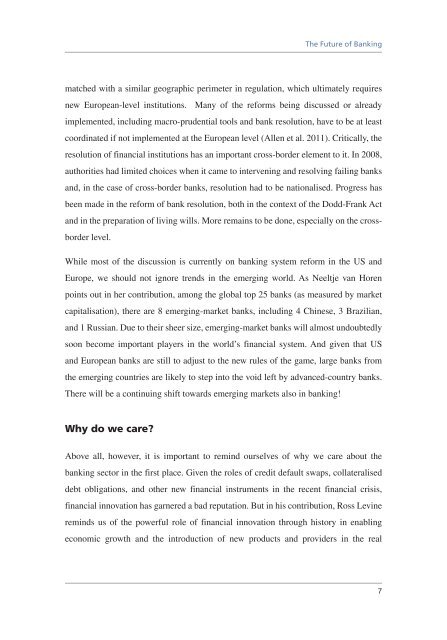You also want an ePaper? Increase the reach of your titles
YUMPU automatically turns print PDFs into web optimized ePapers that Google loves.
The Future of Banking<br />
matched with a similar geographic perimeter in regulation, which ultimately requires<br />
new European-level institutions. Many of the reforms being discussed or already<br />
implemented, including macro-prudential tools and bank resolution, have to be at least<br />
coordinated if not implemented at the European level (Allen et al. 2011). Critically, the<br />
resolution of financial institutions has an important cross-border element to it. In 2008,<br />
authorities had limited choices when it came to intervening and resolving failing banks<br />
and, in the case of cross-border banks, resolution had to be nationalised. Progress has<br />
been made in the reform of bank resolution, both in the context of the Dodd-Frank Act<br />
and in the preparation of living wills. More remains to be done, especially on the crossborder<br />
level.<br />
While most of the discussion is currently on banking system reform in the US and<br />
Europe, we should not ignore trends in the emerging world. As Neeltje van Horen<br />
points out in her contribution, among the global top 25 banks (as measured <strong>by</strong> market<br />
capitalisation), there are 8 emerging-market banks, including 4 Chinese, 3 Brazilian,<br />
and 1 Russian. Due to their sheer size, emerging-market banks will almost undoubtedly<br />
soon become important players in the world’s financial system. And given that US<br />
and European banks are still to adjust to the new rules of the game, large banks from<br />
the emerging countries are likely to step into the void left <strong>by</strong> advanced-country banks.<br />
There will be a continuing shift towards emerging markets also in banking!<br />
Why do we care?<br />
Above all, however, it is important to remind ourselves of why we care about the<br />
banking sector in the first place. Given the roles of credit default swaps, collateralised<br />
debt obligations, and other new financial instruments in the recent financial crisis,<br />
financial innovation has garnered a bad reputation. But in his contribution, Ross Levine<br />
reminds us of the powerful role of financial innovation through history in enabling<br />
economic growth and the introduction of new products and providers in the real<br />
7














